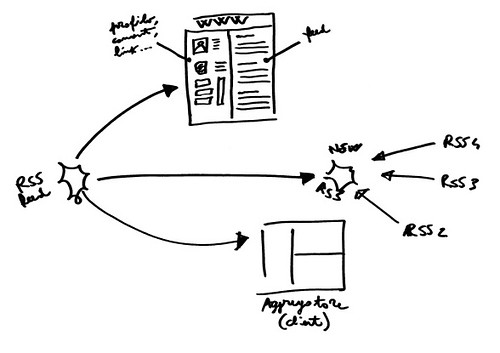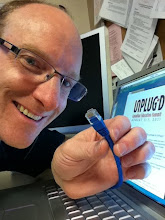
Has Twitter resulted in the decline of 'serious' blogging.
Will Richardson's recent post "
What I Hate About Twitter" raises the issue:
"...it feels like the “conversation” is evolving (or would that be devlolving) into pieces instead of wholes, that the connections and the threads are unraveling, almost literally."In reflection, here are Five personal thoughts about the evolving tool that is
Twitter:1]
Twitter is not a blogging tool: It is a jumping off point. It is the easiest way for new educator to discover the wonders of the edublogsphere. By sharing a combination of resources, links and personal updates, I hope to provide potential avenues for learning. It is in the hope of finding similar nuggets that I continue to check in. The number of live feeds and back-channel chats I’ve engaged in this year would not have been possible otherwise.
2]
Twitter is a tool for building and maintaining relationships. That is why social tweets are valuable. Knowing that we have lives outside of education, somehow makes each of us more ‘real’ to one another.
3]
Twitter is close to LIVE. With the GPS and photo technologies built into current phone technologies, I believe that we are engaged in crude use of a tool that will continue to evolve into a richer reporting and sharing tool.
4]
Twitter is not a conversation tool, but is an elevator chat room where you might be invited to dinner; nudged to attend a workshop; or asked a question. Never knowing who will be on the elevator, the traveler cannot predict where he or she will be engaged.
5]
The openness of the content to other developers and aggregators is what gives Twitter a big advantage. The many competitors trying to leverage similar platforms, will have to add value in order for large networks to jump ship.
Tip to developers: Develop GROUP tools, allowing me to send semi-private messages to chunks of followers (family; teachers; local; conference-goers; workshop attendees…), and you just might get my tweets.
The comments appended to
Will Richardson's post, are well over 100, and model the type of rich discussion that just isn't possible in
Twitter's 140 character posts. It seems that Twitter still touches a nerve in real blog readers... To help further the discussion, I've highlighted excerpts from a few of my favourite comments:
1]
Mathieu Plourde"I consider Twitter to be a gateway to becoming an active 21st century web citizen."2]
Gina Webster "I realize that my interactions and experiences with Twitter really inspired me to set up this blog, to design a new, more interactive webspace for my students and to participate in numerous Web 2.0 discussions in forums I’ve never visited before."3]
Ewan McIntosh"Twitter’s not for conversation, it’s for shouting out. It’s for finding some friends in a foreign city who want to share a beer with you. It’s for being snarky so your blog, which for me is personal property, can remain snarkiless. That’s it for me: Twitter is transient (yet permanent) fun and intrigue, which belongs to the community who are there, at that minute or that day, and my blog belongs entirely to me, is more permanent and is where conversations *I* am part of belong."4]
Clay Burell"Beyond that, I tend to jump in, swim around like a fish in a wine barrel, then flop out to dry up for a few days or weeks. Then jump back in again. I love the playfulness, the sharing, the relationships."
5]
Sheryl Nussbaum-Beach"That said.. if an intelligent conversation spontaneously breaks out - anywhere- I say be in the Zen of the moment and go with it. I tend to have those kinds of conversations at the most unexpected places- cabs, waiting for a plane, etc. And the truth is that after having a conversation like that with Gary and those of you that also chimed in (thank you by the way)that I will go blog. It is those little bursts of informational inspiration about things that really matter that act as the catalyst toward helping me find the time to blog in my busy day."6]
Gary Stager"One thing we learned more than a decade ago at Pepperdine is that you need a mixture of synchronous and asynchronous communication opportunities online in order to support a variety of teaching styles, learning styles AND a range of different activities."7]
Kerry J.Ya’ know - sometimes it’s NOT about bringing about world peace or changing the lives and learning of your learners. Sometimes when you’re having seemingly innocuous conversations about the mundane, the divine breaks out.Teacher 2.0 Podcast #100 reflects on Twitter as a way to expand the audience of learners.Image Credits: Rodd Lucier (building on the work of Yiying Lu); Brian Solis
 As the ETMOOC gets underway in earnest, many of the participants will be blogging about their learning, some for the very first time. As participants draw connections between their ideas, these blog posts will rub up against one another, and like spokes centred on a common central idea, we'll all be able to move forward together. This, in spite of the fact that reading habits, (and consequently writing habits) are changing. These ideas led me to the two minute reflection below...
As the ETMOOC gets underway in earnest, many of the participants will be blogging about their learning, some for the very first time. As participants draw connections between their ideas, these blog posts will rub up against one another, and like spokes centred on a common central idea, we'll all be able to move forward together. This, in spite of the fact that reading habits, (and consequently writing habits) are changing. These ideas led me to the two minute reflection below...







